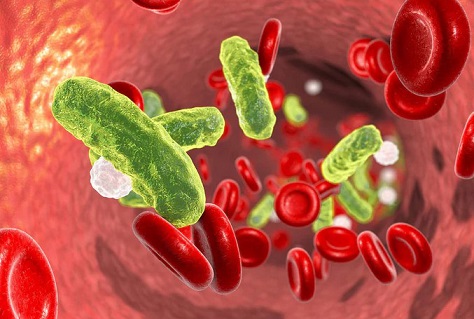Nikhil Prasad Fact checked by:Thailand Medical News Team Jun 27, 2024 1 year, 5 months, 3 weeks, 1 day, 23 hours, 52 minutes ago
Medical News: Have you ever wondered how the food you eat might affect your brain? Recent studies are shedding light on a surprising connection between our gut health and neurodegenerative diseases like Alzheimer's, Parkinson's, and Huntington's. This fascinating link revolves around a condition called metabolic endotoxemia, where harmful substances from the gut enter the bloodstream, potentially leading to brain inflammation and damage. This
Medical News report covers a study review by researchers from Wroclaw University of Medicine-Poland that details about this condition which current incidence rate is rising especially in the Western countries.
 Metabolic Endotoxemia And Brain Health
What is Metabolic Endotoxemia?
Metabolic Endotoxemia And Brain Health
What is Metabolic Endotoxemia?
Metabolic endotoxemia (ME) occurs when bacterial endotoxins, specifically lipopolysaccharides (LPSs), leak from the gut into the bloodstream. This can lead to low-grade systemic inflammation, particularly in individuals following a high-fat Western diet. This inflammation is often subtle, without overt symptoms of infection, but it can have profound effects on overall health.
How Diet Influences Endotoxemia
The type of fat in our diet plays a crucial role in metabolic endotoxemia. Saturated fats, commonly found in processed foods, can increase endotoxin levels in the blood by about 60%. In contrast, unsaturated fats, like those in fish and nuts, can reduce endotoxin levels by about 50%. This difference is significant because it shows how dietary choices directly impact the level of harmful substances circulating in our bodies.
The Role of Gut Microbiota
Our gut is home to trillions of bacteria, which play a crucial role in maintaining health. However, an unhealthy diet can disrupt this balance, leading to a condition called dysbiosis. Dysbiosis is characterized by a reduction in beneficial bacteria like Bacteroidota and Lactobacillus and an increase in harmful ones like Firmicutes and Gammaproteobacteria. This imbalance not only affects gut health but also contributes to the leakage of endotoxins into the bloodstream, promoting systemic inflammation.
Endotoxemia and the Blood-Brain Barrier
One of the most concerning aspects of metabolic endotoxemia is its potential impact on the brain. The blood-brain barrier (BBB) is a protective shield that prevents harmful substances in the blood from entering the brain. However, chronic inflammation caused by endotoxemia can weaken this barrier, allowing endotoxins to infiltrate the brain. This infiltration can activate the brain's immune cells, known as microglia, leading to neuroinflammation - a key factor in neurodegenerative diseases.
The Connection to Neurodegenerative Diseases
Neurodegenerative diseases, including Alzheimer's, Parkinson's, and Huntington's, are characterized by the progressive loss of nerve cells. While the exact causes of these diseases are still not fully understood, chronic inflammation is a common feature. Studies have
shown that elevated levels of endotoxins are present in the blood and brain tissues of patients with these diseases. This suggests that metabolic endotoxemia could be a significant contributor to their development.
Alzheimer's Disease
In Alzheimer's disease (AD), endotoxins can exacerbate the formation of amyloid plaques and tau protein tangles, which are hallmark features of the disease. These plaques and tangles disrupt communication between neurons, leading to cognitive decline. Research has shown that endotoxins can increase the production and accumulation of these harmful proteins, further promoting neurodegeneration.
Parkinson's Disease
Parkinson's disease (PD) is another condition where endotoxemia plays a role. Endotoxins can trigger the activation of microglia, leading to the release of pro-inflammatory cytokines. These cytokines can damage the dopamine-producing neurons in the brain, which are crucial for controlling movement. This damage results in the characteristic motor symptoms of PD, such as tremors and stiffness.
Huntington's Disease
Huntington's disease (HD) is a genetic disorder that causes the progressive breakdown of nerve cells in the brain. Studies have found that endotoxins can enhance the inflammatory response in the brains of HD patients, exacerbating the disease's progression. This inflammation can lead to the death of neurons and the worsening of symptoms.
Mitigating the Effects of Endotoxemia
While the link between diet, endotoxemia, and neurodegeneration is concerning, there are steps we can take to mitigate these effects. Incorporating more unsaturated fats into the diet, such as those found in fish, nuts, and seeds, can help reduce endotoxin levels. Additionally, consuming a diet rich in fiber from fruits, vegetables, and whole grains can support a healthy gut microbiota, reducing the risk of dysbiosis and endotoxemia.
Conclusion
The emerging research on metabolic endotoxemia highlights the profound impact of diet and gut health on our overall well-being, particularly brain health. By making informed dietary choices, we can potentially reduce the risk of neurodegenerative diseases and promote a healthier, more vibrant life. Understanding the gut-brain connection opens new avenues for preventing and managing these debilitating conditions, emphasizing the importance of holistic approaches to health.
The study review was published in the peer reviewed International Journal of Molecular Sciences.
https://www.mdpi.com/1422-0067/25/13/7006
For the latest about Metabolic Endotoxemia, keep on logging to Thailand
Medical News.
Read Also:
https://www.thailandmedical.news/news/the-hidden-threat-lurking-in-the-wake-of-covid-19-the-urgent-need-for-sepsis-awareness
https://www.thailandmedical.news/news/researchers-discover-lipoteichoic-acid-from-probiotic--lactobacillus-paracasei-which-can-aid-in-aging-related-leaky-gut-and--inflammation
